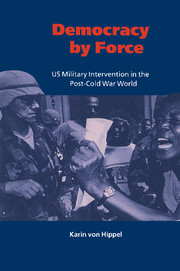Book contents
- Frontmatter
- Contents
- List of maps
- Acknowledgements
- List of abbreviations
- 1 Introduction: dangerous hubris
- 2 Invasion or intervention? Operation Just Cause
- 3 Disappointed and defeated in Somalia
- 4 Heartened in Haiti
- 5 UNPROFOR, IFOR and SFOR: can peace be FORced on Bosnia?
- 6 Hubris or progress: can democracy be forced?
- Bibliography
- Index
5 - UNPROFOR, IFOR and SFOR: can peace be FORced on Bosnia?
Published online by Cambridge University Press: 22 September 2009
- Frontmatter
- Contents
- List of maps
- Acknowledgements
- List of abbreviations
- 1 Introduction: dangerous hubris
- 2 Invasion or intervention? Operation Just Cause
- 3 Disappointed and defeated in Somalia
- 4 Heartened in Haiti
- 5 UNPROFOR, IFOR and SFOR: can peace be FORced on Bosnia?
- 6 Hubris or progress: can democracy be forced?
- Bibliography
- Index
Summary
The war in Bosnia persisted for over three years (March 1992–August 1995) before the international community responded in a decisive manner with the right combination of force and diplomacy, even though attempts at the latter began in 1991 and NATO planes first started bombing in April 1994. Once again, the international community, led by the United States and Europe, became entangled in nation-building, this time through an attempt to end the most distressing conflict in Europe since World War II. What happened during the three and a half years it took the international mediators to achieve the fragile peace contrived at Dayton in November 1995? Will Dayton endure?
This chapter addresses these questions in three parts: the first looks at the failure of the European Community (later Union) and the UN to stop the fighting through the application of sanctions, mediation-by-recognition and the establishment of the UN Protection Force (UNPROFOR); the second part examines the many different peace plans that did not deliver the promised peace, the one that did, and the force that was necessary to secure that peace; and finally, the concluding section analyses Dayton in practice, lessons learned and implications for the future Bosnian state. Although the collapse of Yugoslavia engendered four Balkan wars, this chapter focuses only on that in Bosnia because it was the bloodiest, the longest, attracted the most international attention, and ultimately dragged in the international community, which in turn caused the focus to shift to rebuilding state structures.
- Type
- Chapter
- Information
- Democracy by ForceUS Military Intervention in the Post-Cold War World, pp. 127 - 167Publisher: Cambridge University PressPrint publication year: 1999

